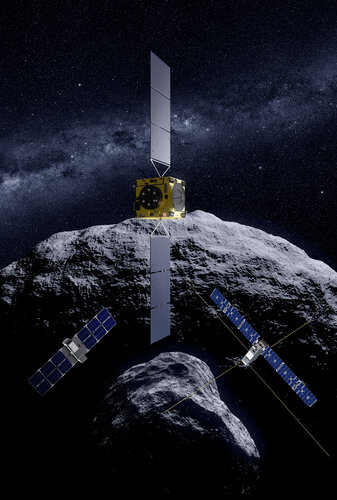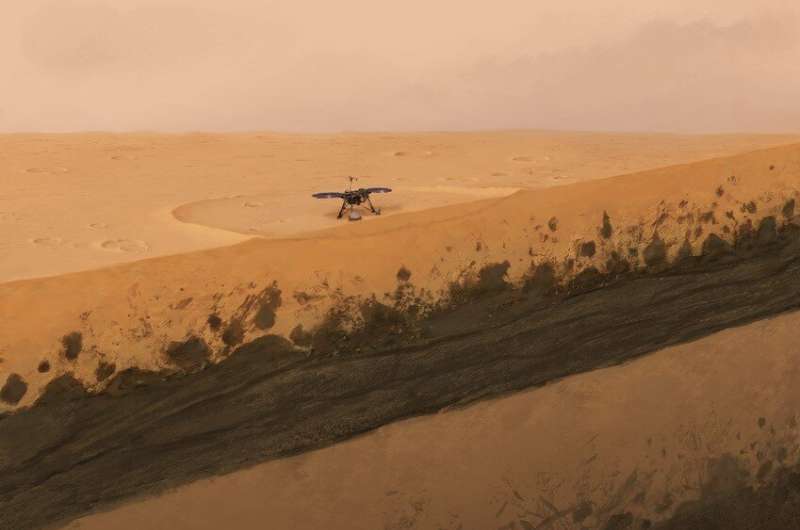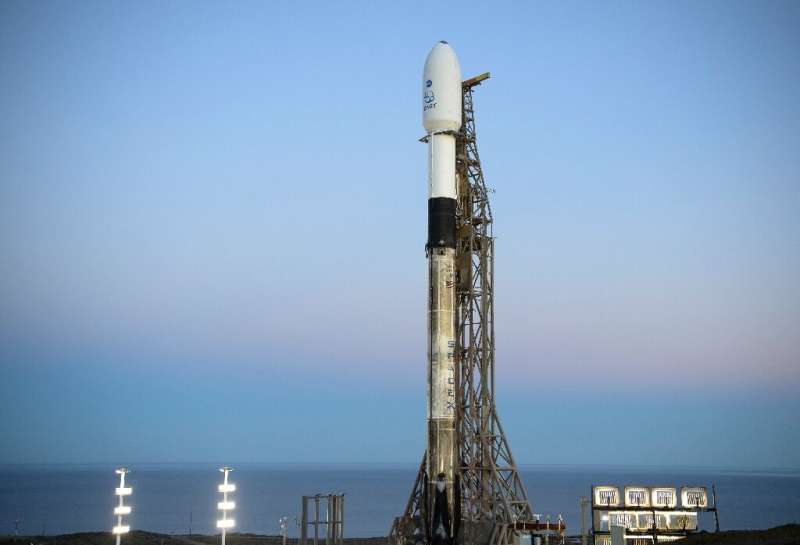
Copernical Team
After the crash comes Hera
 Image:
After the crash comes Hera
Image:
After the crash comes Hera Analysis of Mars's wind-induced vibrations sheds light on the planet's subsurface properties

Astronomers discover more than 300 possible new exoplanets

UCLA astronomers have identified 366 new exoplanets, thanks in large part to an algorithm developed by a UCLA postdoctoral scholar. Among their most noteworthy findings is a planetary system that comprises a star and at least two gas giant planets, each roughly the size of Saturn and located unusually close to one another.
The discoveries are described in a paper published today in the Astronomical Journal.
The term "exoplanets" is used to describe planets outside of our own solar system.
NASA launches spacecraft to kick an asteroid off course

NASA is preparing to launch a mission to deliberately smash a spacecraft into an asteroid—a test run should humanity ever need to stop a giant space rock from wiping out life on Earth.
It may sound like the stuff of science fiction, but the DART (Double Asteroid Redirection Test) is a real proof-of-concept experiment, blasting off at 10:21 pm Pacific Time Tuesday (0621 GMT Wednesday) aboard a SpaceX rocket from Vandenberg Space Force Base in California.
Its target object: Dimorphos, a "moonlet" around 525 feet (160 meters, or two Statues of Liberty) wide, circling a much larger asteroid called Didymos (2,500 feet or 780 meters in diameter), which together orbit the Sun.
BlackSky set to expand its EO constellation for real-time global intelligence
 BlackSky's latest satellites reached orbit and delivered first insights within 14 hours of launch. The company's constellation growth signals a return to space and an increased capacity for global customers.
"Growing BlackSky's constellation and increasing our rapid-revisit monitoring capabilities is about more than just getting satellites into space," said Nick Merski, BlackSky chief oper
BlackSky's latest satellites reached orbit and delivered first insights within 14 hours of launch. The company's constellation growth signals a return to space and an increased capacity for global customers.
"Growing BlackSky's constellation and increasing our rapid-revisit monitoring capabilities is about more than just getting satellites into space," said Nick Merski, BlackSky chief oper Decisions from the ESA Intermediate Ministerial Meeting 2021
 Government ministers in charge of space activities in ESA's Member States today met at an Intermediate Ministerial Meeting held in Matosinhos, Portugal.
The Council of Ministers unanimously adopted a Resolution to accelerate the use of space in Europe (the "Matosinhos manifesto") to tackle the urgent and unprecedented societal, economic and security challenges faced by Europe and its citiz
Government ministers in charge of space activities in ESA's Member States today met at an Intermediate Ministerial Meeting held in Matosinhos, Portugal.
The Council of Ministers unanimously adopted a Resolution to accelerate the use of space in Europe (the "Matosinhos manifesto") to tackle the urgent and unprecedented societal, economic and security challenges faced by Europe and its citiz First Airbus built Inmarsat-6 satellite shipped to Japan ready for launch
 The first Airbus built Inmarsat-6 , I-6 F1, satellite has been shipped from Airbus in Toulouse to Tanegashima in Japan ready for launch.
The first satellite of the Inmarsat-6 series is due to be launched on an H-IIA launch vehicle built by Mitsubishi Heavy Industries (MHI) in December. Inmarsat-6 F1 is based on Airbus' ultra-reliable Eurostar E3000 spacecraft and will be the 54th Eurostar
The first Airbus built Inmarsat-6 , I-6 F1, satellite has been shipped from Airbus in Toulouse to Tanegashima in Japan ready for launch.
The first satellite of the Inmarsat-6 series is due to be launched on an H-IIA launch vehicle built by Mitsubishi Heavy Industries (MHI) in December. Inmarsat-6 F1 is based on Airbus' ultra-reliable Eurostar E3000 spacecraft and will be the 54th Eurostar SES, Mddiai RK, RCSC, and AsiaNetCom launch O3b Satellite test across remote Kazakhstan
 Residents of two remote Kazakhstan villages can now benefit from unprecedented Internet speeds via satellite-enabled Wi-Fi, through a network set up for 30 days by the leading global content connectivity solutions provider SES.
The demo is implemented in cooperation with the Republican Center for Space Communications (RCSC), a subsidiary of the Ministry of Digital Development, Innovations
Residents of two remote Kazakhstan villages can now benefit from unprecedented Internet speeds via satellite-enabled Wi-Fi, through a network set up for 30 days by the leading global content connectivity solutions provider SES.
The demo is implemented in cooperation with the Republican Center for Space Communications (RCSC), a subsidiary of the Ministry of Digital Development, Innovations NASA provides update on Webb Telescope launch
 The launch readiness date for the James Webb Space Telescope is moving to no earlier than Dec. 22 to allow for additional testing of the observatory, following a recent incident that occurred during Webb's launch preparations.
The incident occurred during operations at the satellite preparation facility in Kourou, French Guiana, performed under Arianespace overall responsibility. Technicia
The launch readiness date for the James Webb Space Telescope is moving to no earlier than Dec. 22 to allow for additional testing of the observatory, following a recent incident that occurred during Webb's launch preparations.
The incident occurred during operations at the satellite preparation facility in Kourou, French Guiana, performed under Arianespace overall responsibility. Technicia ASU team celebrates 20th anniversary of NASA's Mars Odyssey Orbiter arrival at the Red Planet
 This year, NASA is observing the 20th anniversary of the 2001 Mars Odyssey orbiter, the longest-lived spacecraft at the Red Planet; and a mission that has helped locate water ice, find landing sites and study Mars' mysterious moons. The spacecraft launched on April 7, 2001, and arrived at the Red Planet on Oct. 24, 2001.
One of the scientific instruments onboard Odyssey is called the Therm
This year, NASA is observing the 20th anniversary of the 2001 Mars Odyssey orbiter, the longest-lived spacecraft at the Red Planet; and a mission that has helped locate water ice, find landing sites and study Mars' mysterious moons. The spacecraft launched on April 7, 2001, and arrived at the Red Planet on Oct. 24, 2001.
One of the scientific instruments onboard Odyssey is called the Therm 
